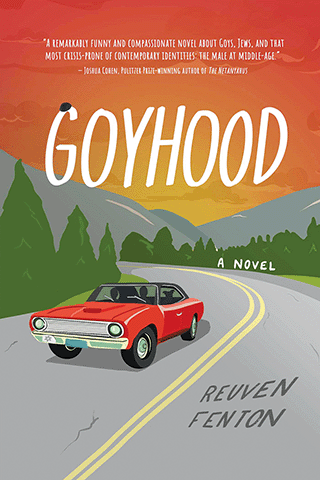Reviewed by NEAL GENDLER
Mayer Belkin has a problem: He’s not Jewish.
This is a problem?
Yes. Mayer — formerly Marty — is a scholar at New York’s prestigious Ohr Lev yeshiva (religious school), devoted for two decades to studying the Torah, the Talmud’s two million words and centuries of rabbinic writings.
Beautiful wife Sarah is the daughter of the rosh yeshiva (head of school), whose family wealth has provided and provisioned the couple’s house and pays their expenses, including a housekeeper who cooks, cleans and buys the groceries.
This fell into Mayer’s lap during his second year at Ohr Lev, on the odd condition that he remain a perpetual student and never train for the rabbinate or apply to join Ohr Lev’s faculty.
“Mayer still pinched himself from time to time to make sure he wasn’t dreaming,” says Goyhood author Reuven Fenton, a New York Post reporter whose clever, skillful novel reflects graduations from Yeshiva University and the esteemed Columbia University School of Journalism.
The delightful story, requiring a little suspension of disbelief, is spiced with biblical and rabbinic quotations in English and transliterated Hebrew, usually translated. I can’t imagine a gentile writing Goyhood — it’s a Jewish joy ride.
The story begins as very dissimilar twins Marty and David are 12, raised without religion by their promiscuous mother Ida Mae, widow of a Jew, in the poor town of New Moab, Georgia. One day, biking through adjoining, prosperous Moab, they pass a tall steel menora outside a yellow house with a banner saying Chabad of Moab.
Back home, a slender, bearded man in a black suit and hat stands at the door, talking with Ida Mae. He’s Chabad Rabbi Yossi Kugel, visiting people with Jewish-sounding names. He says the twins need to begin studying for Bar Mitzva.
Marty grabs Judaism with both hands, departing “to start a new life in Brooklyn, leaving David in the care of their hapless mother.” Ida Mae becomes Yossi’s secretary. David begins a troubled life.
Years later, Mayer gets a call from David, with whom he’s not spoken in eight years. Ida Mae has died. Mayer, who’s not left his quarter square mile neighborhood in four years, is overflowing with Torah knowledge but so little else that he doesn’t know how to book an airline ticket. Sarah, who uses the internet on her phone and runs the household, books Mayer’s flight to Atlanta, packs his bag and gives him a “kosher” cellular phone (no internet) so she can reach him.
At the Atlanta airport, pudgy Marty, in an ill-fitting, cheap black suit, tzitzis and worn-out shoes, spots athletic, expensively dressed David; he’s struck it rich in e-cigarettes. Jacob and Esau embrace.
With less than 90 minutes until the funeral, they are puzzled that Rabbi Yossi insists on first meeting them at Ida Mae’s home.
There, Yossi drops a bombshell: Ida Mae sent Yossi a pre-suicide letter saying she’s not Jewish. Indeed, grandfather Karl may have been in the SS. She has been cremated.
Suddenly goyim (non-Jews), the twins are stunned. Mayer faints.
There’s an easy fix: Meet with a beit din (Jewish court) for conversion. Usually, this requires a year of study; Mayer would sail through. But the court, in New York, can’t fit him in for a week. David persuades Mayer to fill the time with a trip.
David gives his limo driver the week off and rents a Dodge Charger. Off they go, David smoking a joint while speeding a reluctant Mayer toward New Orleans, which he considers an American Sodom.
In New Orleans, David turns onto gaudy, crowded, noisy Bourbon Street. Mayer, never having seen Las Vegas or even Times Square, those “meccas of excess,” stares “in unblinking horror.”
At their hotel, David leaves with Ida Mae’s urn, saying, “I’m taking Mom out for gumbo and a beer.”
In the morning, Mayer cranks the shower to scalding. “Inspired by a verse from Isaiah — ‘Wash, clean yourselves, remove the evil of your deeds from my eyes’ — he scrubbed his skin as if the bar of soap were sandpaper.”
David has bought him casual clothes, and somewhere, his kipa vanished. Then he discovers a woman in his bed. He rushes out.
Sarah calls. Mayer tells her the street noise is a truck outside Ida Mae’s window. Sarah says she’s flying down for Shabbat. Oy!
Famished, Mayer wanders Bourbon Street. At an open-air coffee shop, he hears David call him, waving from a table with Ida Mae and an attractive, amber-toned woman.
“It was perhaps the awkwardest moment of [Mayer’s] life. Goyhood, he thought — the state of rebounding from one travesty to the next.”
The woman is David’s acquaintance Charlayne, once one of the few Black children in Duluth. She’s financially successful, headed to hiking the Appalachian Trail. Sharp and inquisitive, she wants to learn about Marty’s cloistered life.
A red convertible rounds the corner, blasting music that sets off a singing flash mob.
David offers Charlayne a ride to the start of the trail on the twins’ drive to New York.
As they travel, Sarah calls. Skimming the internet, she’d happened onto someone’s video of the flash mob. It showed the threesome — bare-headed Mayer in civilian clothes, far from New Moab.
As if not being Jewish wasn’t traumatic enough.
More unlikely surprises await, very deserving to be read. But don’t peek at the epilogue. You should share my astonishment.
***
Neal Gendler is a Minneapolis writer and editor.
(American Jewish World, June 2024)




















